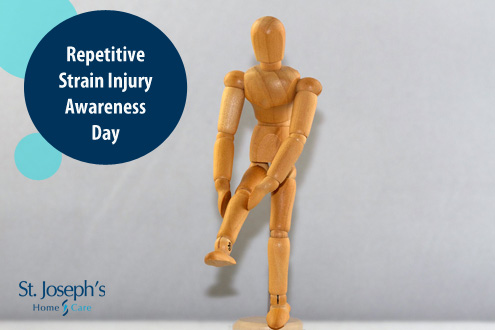
February 28th is Repetitive Strain Injury (RSI) Awareness day! RSI’s are among the most common workplace injuries related to the overuse of muscles and tendons in the upper body, especially the hands, wrists, forearms, elbows, shoulders, back or neck.
RSI is defined as an "injury to the musculoskeletal and nervous systems that may be caused by repetitive tasks, forceful exertions, vibrations, mechanical compression, or sustained or awkward positions."
Causes
Many repetitive strain injuries develop over a long period of time rather than suddenly.
Things that can put you at risk of RSI include:
- Repetitive activities
- Doing a high-intensity activity for a long time without rest
- Poor posture or activities that require you to work in an awkward position
- Stress can also be a contributing factor
RSI is most commonly caused by a repeated action carried out on a daily basis. A variety of jobs can lead to RSI, such as working on an assembly line, at a supermarket checkout, or typing at a computer etc.
It is important that your working environment is laid out so that you can work comfortably.
Symptoms
The symptoms of repetitive strain injury (RSI) usually develop gradually. They can range from mild to severe.
Symptoms can vary, but often include:
- pain, aching, or tenderness
- burning
- stiffness
- throbbing
- tingling or numbness
- tightness
- swelling
- weakness
- cramps
Prevention/Treatment
Preventing RSI or relieving your symptoms involves understanding what causes the problem and recognizing symptoms early. This includes your work, hobbies, general stress, and posture.
Think about your working environment and what activity may be causing the problem. Try to take steps to reduce how much time you spend doing this activity or change how you do it. If you can't stop doing it completely, take regular, short breaks to stretch and move about.
Some people with symptoms of RSI find that including exercise in their daily routine, such as walking, swimming, and stretching also helps ease their symptoms.
You can review other aspects of your lifestyle yourself, such as your hobbies or general stress levels. The most important thing is to notice the factors that are causing or aggravating RSI and make changes accordingly, whether it’s eliminating or modifying the behaviour to stay safe and healthy.
Seek advice from a doctor or specialist on ways you can prevent your symptoms from getting worse or finding devices that may help you in everyday life to help ease the strain.


